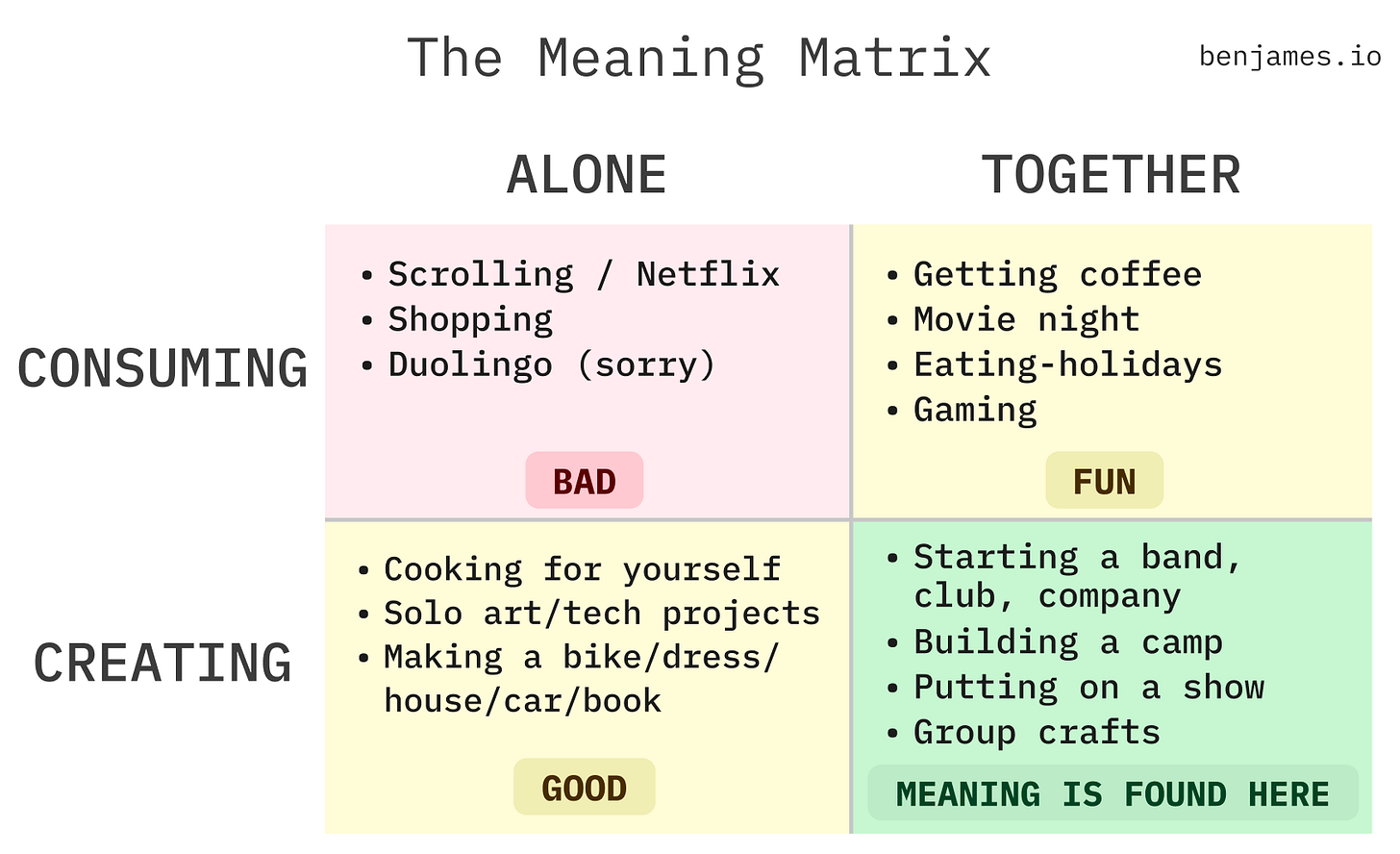Using team identity to build success
ALSO: 'it's not a you problem, it's a we problem'
What went wrong with England’s Golden Generation? A cohort of supremely talented footballers who didn’t perform at their highest level when playing for their country. In a recent interview Stephen Gerrard explained that when he turned up for his first England camp in 2000 he was expecting Manchester United players to ambush him. There was such entrenched oppositional identity that the players never lunched together or gelled as a group. He said that players used to sit and eat with their club teammates. They saw themselves as Liverpool or Man United players first and foremost.
When Gareth Southgate became England manager he set out to define what it meant to be an England player. He said:
“There’s something I tell our players before every England game, and the reason that I repeat it is because I really believe it with all my heart. I tell them that when you go out there, in this shirt, you have the opportunity to produce moments that people will remember forever.”
He worked with the likes of Owen Eastwood who asks players to think of themselves as short-term custodians of the England shirt, responsible for passing it to the next generation in a better place. He was obsessed with building a group identity for the players. Some of this involved the players celebrating their pride in their ethnic heritage and its relationship with being a modern England player. Southgate said, ‘everyone has a different idea of what it actually means to be English. What pride means. For me, personally, my sense of identity and values is closely tied to my family and particularly my granddad.’ He left the job as the most successful manager in the last fifty years.
This week’s podcast is a further exploration of identity, this time in the form of an interview with psychologist and leadership coach Jeremy Holt.
Holt has found that whether in Olympic teams or amateur teams, from football to volleyball, having a strong group identity is transformational. His work found that team identity was responsible for a substantial increase in team performance. His headline was that strong identities lead to teams being 53% more successful than teams with weak identities: the difference between promotion and relegation.
Jeremy has written a book, For The Love of the Game, that takes a practical, hands-on approach to building team identity. The book is explicitly about sport teams but I am certain that all of the exercises are relevant to all teams. Jeremy works with lots of non-sport organisations and uses the same approach with them.
The book is filled with lots of conversations to have with your team, in meetings, over meals, on the bus. For example:
If someone new joined tomorrow, what personal story would you share that would tell them what this team is all about?
Think back to a moment that showed what makes us different? What happened? How did it feel to be part of that moment?
What impact do you want this team to have beyond hitting our targets?
What’s the most meaningful thing that has happened to you in this team?
What strength do we have in this team that we haven’t unlocked yet?
The most important thing with learnings from the last three podcast is turning the insight into practice. Getting it out of theory and into things that you test out with your team. Jeremy’s approach is a great way to challenge yourself to do that.
Listen: website / Apple / Spotify
PS. Of course identity alone isn’t responsible for the transformation of the England football team under Southgate. You might say that there’s also a story about preparing for penalty shootouts. (Or ensuring stronger psychological safety after them - I’ve covered some fascinating analysis of this here). The one thing that working in social media taught me is ‘beware simple answers to complicated problems’.
In the last podcast with Alex Haslam, he said that the mechanism by which social identity works is ‘depersonalisation’. I’ve reflected a lot on this, it very much reminds me of this post last month from the genius that is Frankie McNamara where he opines ‘when community collapsed we all went to counselling’ maybe ‘it isn’t a you problem, it’s a we problem’:
(Is there a better analyser of contemporary life, right now? His post on the evolution of Irish identity is actually breathtakingly good).
Listen:
Owen Eastwood talks about his approach with teams (and a second interview with Owen)
Former England culture coach Pippa Grange explains her work with the team
Professor Damian Hughes explains how FC Barcelona defined their culture
Thanks to Deliveroo for Work for sponsoring this week’s Make Work Better
I love the smell of collaboration in the morning:
Someone described it as a ‘Quiet Quitting Assembly line’.
You might have seen this ‘meaning matrix’ by Ben James. He said meaning in life is formed when we find ourselves creating together with others. I think this is why work can be the source of immense fulfillment for us. If we can create strong group identities and then feel like we’re achieving excellence together it can be hugely fulfilling for us.
Despite all of the reports that AI projects are failing an extensive investigation out of Wharton suggests that most firms are happy with their AI projects seeing return already. 46% of businesses leaders are use AI themselves everyday
Economist Daniel Susskind gave a fascinating lecture this week about how improvement in technology typically leads to more skilled jobs to operate it:
He says ‘Since the industrial revolution, workers who worried that would be replaced by machines have largely been proven wrong’
I’m obsessed with the ‘property theory of everything’ - here someone explains how Zohran Mamdani won in New York: NYC hourly wages have gone from 35% more than US average to 20% more (while rents are 2x the US average). (He also won because politicians need to talk about hope of a better tomorrow, of course)
On the subject of that, is there anything more depressing than the lack of imagination shown by the Labour Government? Bureaucratic career politicians with no ideas. Now they’re trying to crack down on 4-day week experiments - all the reasons giving in this article are PR dismissal points, in fact the county council were using 4-day weeks to make relatively low paid jobs appealing to more candidates
Here’s a TikTok of someone explaining his employer has installed a ‘timetracker’ app on him. The app takes a screenshot of someone’s computer desktop every 10 minutes and tracks what they do on their computer. Here’s someone else detailing how it works). Then someone on Reddit says that their firm started doing this, so employees decided to stop communicating with management. All of it is utterly dystopian








Absolutely the best read in my inbox, as always. Thanks, @Bruce Daisley.